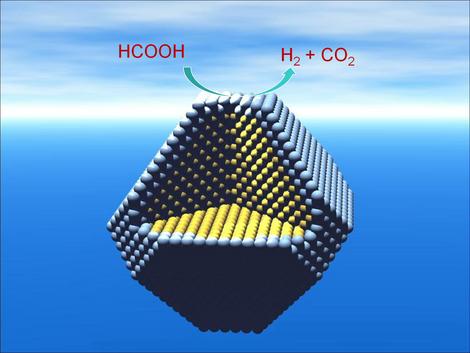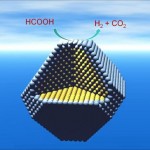
 Technology using catalysts which make hydrogen from formic acid could eventually replace lithium batteries and power a host of mobile devices.
Technology using catalysts which make hydrogen from formic acid could eventually replace lithium batteries and power a host of mobile devices.
Edman Tsang of Oxford University’s Department of Chemistry and colleagues are developing new catalysts which can produce hydrogen at room temperature without the need for solvents or additives.
Their initial results, reported in a recent paper in Nature Nanotechnology, are promising and suggest that a hydrogen fuel cell in your pocket might not be that far away.
The new approach involves placing a single atomic layer of palladium atoms onto silver nanoparticles. ‘The structural and electronic effects from the underlying silver greatly enhance the catalytic properties of palladium, giving impressive activity for the conversion of formic acid to hydrogen and carbon dioxide at room temperature,’ Edman told us.
He explains that the storage and handling of organic liquids, such as formic acid, is much easier and safer than storing hydrogen. The catalysts would enable the production of hydrogen from liquid fuel stored in a disposable or recycled cartridge, creating miniature fuel cells to power everything from mobile phones to laptops.
Another advantage of the new technology is that the gas stream generated from the reaction is mainly composed of hydrogen and carbon dioxide but virtually free from catalyst-poisoning carbon monoxide; removing the need for clean-up processes and extending the life of the fuel cells .
The chemists have worked closely with George Smith, Paul Bagot and co-workers at Oxford University’s Department of Materials to characterise the catalysts using atom probe tomography. The underlying technology is the subject of a recent Isis Innovation patent application.
‘There are lots of hurdles before you can get a real device, but we are looking at the possibility of using this new technology to replace lithium battery technology with an alternative which has a longer lifespan and has less impact on the environment,’ explains Edman.



